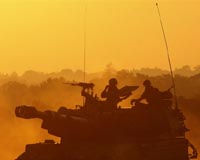| . |  |
. |
United Nations (AFP) May 15, 2009 The five major UN powers on Friday pledged renewed support for the Nuclear Non-Proliferation Treaty, and hailed progress made in preparatory talks for a treaty review conference in 2010. The UN Security Council's five veto-wielding permanent members reiterated in a statement their "enduring and unequivocal commitment to work towards nuclear disarmament, an obligation shared by all NPT states parties." "We note our commitment to use the opportunity of the 2010 Review Conference to preserve international confidence in the Treaty and to strengthen it in all its aspects," Britain, China, France, Russia and the United States said. "We urge all NPT states parties to share in this goal and join us working to ensure a successful and balanced review," they added. They also pledged to "further develop proposals that promise to expand the peaceful use of nuclear energy in ways that reduce proliferation risk." The five also welcomed the decision by Washington and Moscow to negotiate a successor to the 1991 Strategic Arms Reduction Treaty (START), after talks made little progress under former US president George W. Bush. Russian and US officials are due to meet in Moscow next week for the first official round of bargaining on replacing START, seen as a cornerstone of strategic arms control. The Cold War-era treaty placed strict limits on the number of missiles and warheads that Moscow and Washington could have, leading to steep reductions in the nuclear arsenals of both sides. Zimbabwe's UN Ambassador Boniface Chidyausiku, who chaired the two-week preparatory session which ended here Friday, said participants agreed on an "ambitious" agenda for next year's NPT review session. He stresssed the need to maintain a delicate balance between the NPT's three pillars: disarmament, non-proliferation and peaceful use of nuclear energy. A senior US administration official, speaking on condition of anonymity, said he was pleased with the outcome of the preparatory session, particularly the deal on the agenda and rules of procedure for next year's review conference. "We're off to a very good start," the official said, expressing optimism that progress can be made next year on all three pillars of the NPT -- disarmament, non-proliferation and support for peaceful nuclear energy. "There's got to be a balanced approach," he added. The US official also made clear that top US arms control negotiator Rose Gottemoelle did not break new ground last week when she urged presumed atomic powers India, Israel, Pakistan and North Korea to join the NPT. "The United States has always advocated universal adherence" to the NPT, he said while pointing out that it was "the responsibility of all countries to try to create conditions that will make it possible for those countries to join the treaty." The US official said the four presumed nuclear weapons states were unlikely to join the NPT "until there is a change in the overall political and security context" in which they make those decisions. "In the particular case of the Middle East, Israeli adherence to the NPT is only going to be possible in the context of ... full compliance with (the treaty in the region)," he noted. Establishing a Middle East nuclear weapons-free zone depends on Iran fully complying with its NPT obligations and suspending uranium enrichment, he added. Israel, widely considered the Middle East's sole nuclear armed power, suspects Iran of using its uranium enrichment program as a cover to build atomic weapons, a charge that Tehran denies. The previous review conference in May 2005 ended in disarray, with no agreement from the participants. Review conferences have been held every five years since the treaty was ratified in 1970. There are currently 189 signatory countries to the treaty.
Share This Article With Planet Earth
Related Links Learn about nuclear weapons doctrine and defense at SpaceWar.com Learn about missile defense at SpaceWar.com All about missiles at SpaceWar.com Learn about the Superpowers of the 21st Century at SpaceWar.com
 US: Iran threat underlines need for Israel to seek peace
US: Iran threat underlines need for Israel to seek peaceWashington (AFP) May 10, 2009 The US government agrees that Iran's nuclear ambitions pose an "existential threat" to Israel but that only reinforces the need for Middle East peace, a top official said Sunday. General James Jones, President Barack Obama's national security advisor, said Israeli Prime Minister Benjamin Netanyahu would hear the US message on the need for a "two-state" solution first-hand when he comes here ... read more |
|
| The content herein, unless otherwise known to be public domain, are Copyright 1995-2009 - SpaceDaily. AFP and UPI Wire Stories are copyright Agence France-Presse and United Press International. ESA Portal Reports are copyright European Space Agency. All NASA sourced material is public domain. Additional copyrights may apply in whole or part to other bona fide parties. Advertising does not imply endorsement,agreement or approval of any opinions, statements or information provided by SpaceDaily on any Web page published or hosted by SpaceDaily. Privacy Statement |